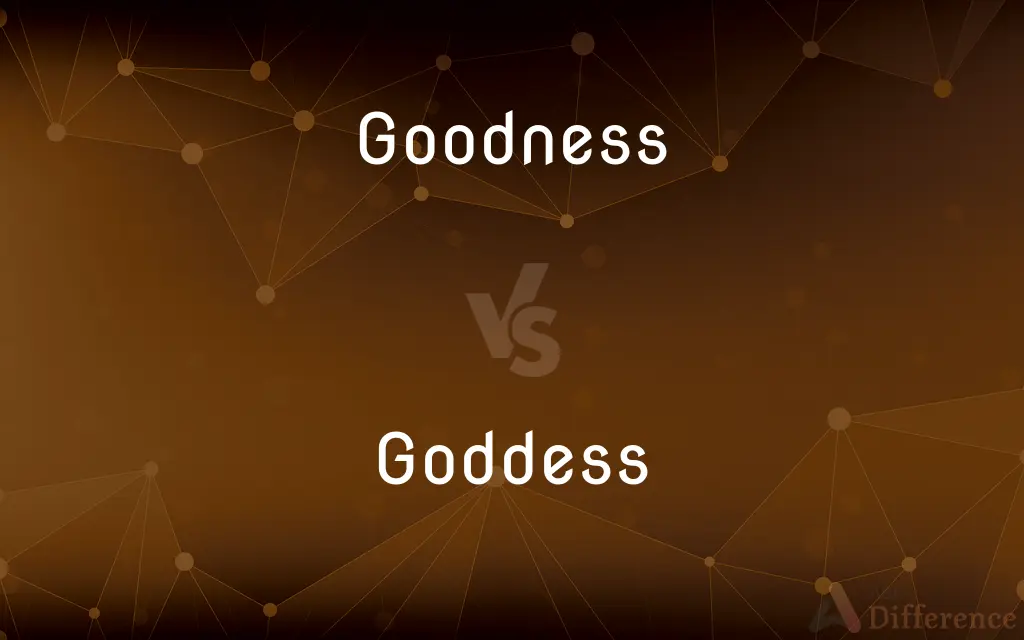Goodness vs. Goddess — What's the Difference?
By Tayyaba Rehman & Maham Liaqat — Updated on April 8, 2024
Goodness reflects moral virtue and kindness, emphasizing ethical behavior and altruism, while Goddess refers to a female deity worshipped in various religions, symbolizing divine power and attributes.

Difference Between Goodness and Goddess
Table of Contents
ADVERTISEMENT
Key Differences
Goodness is a universal concept found in various cultures and religions, denoting moral virtue, ethical behavior, and altruism. It's often seen as an inherent quality that encourages benevolence and kindness towards others. Whereas, a Goddess is a female deity worshipped in polytheistic religions, embodying specific aspects of the natural world, human endeavors, or abstract concepts.
Goodness is subjective and can be perceived differently based on cultural, religious, and personal beliefs. It is often associated with the intent to perform acts of kindness and charity. On the other hand, a Goddess is a defined entity within religious contexts, having specific myths, attributes, and forms of worship associated with her.
In literature and discourse, goodness is frequently used to describe the moral quality of actions, intentions, or characters. It acts as a benchmark for evaluating the ethical dimensions of human behavior. Conversely, Goddesses often appear in mythologies and religious texts, symbolizing various powers, virtues, and domains of influence, such as love, war, fertility, and wisdom.
Goodness does not have a physical form or representation; it is an abstract concept that influences human behavior and societal norms. In contrast, Goddesses are often depicted in art, sculpture, and religious iconography, with distinct visual attributes that reflect their divine roles and powers.
The pursuit of goodness is a personal and communal endeavor, aimed at improving oneself and society through ethical actions and compassionate conduct. Meanwhile, the worship of a Goddess involves rituals, prayers, and ceremonies designed to honor her and seek her blessings or guidance.
ADVERTISEMENT
Comparison Chart
Nature
Abstract concept
Divine entity
Domain
Morality and ethics
Religion and mythology
Representation
Lacks physical form
Often depicted in art and icons
Role
Guides ethical behavior
Embodies specific divine aspects
Influence
Impacts societal norms and personal conduct
Subject of worship and religious devotion
Compare with Definitions
Goodness
Moral quality of being virtuous and kind.
The goodness of her heart was evident in her actions.
Goddess
An idolized woman.
The community treated her like a goddess due to her charitable works.
Goodness
Quality of being good or pleasant.
They enjoyed the goodness of the summer weather.
Goddess
A female deity in polytheistic religions.
Athena was revered as a goddess of wisdom and war in ancient Greece.
Goodness
The beneficial aspect of something.
We discussed the goodness of adopting eco-friendly practices.
Goddess
A woman of extraordinary beauty or grace.
She walked into the room like a goddess, captivating everyone's attention.
Goodness
Generosity and benevolence.
His goodness knew no bounds when it came to helping the needy.
Goddess
The female divine power or a divine feminine aspect.
The goddess aspect is celebrated in many cultures around the world.
Goodness
Essence or core value.
The goodness of the proposal lay in its simplicity.
Goddess
A title for a woman of outstanding achievements.
She was a goddess in the realm of scientific discovery.
Goodness
The state or quality of being good.
Goddess
A female deity
Athena Nike, goddess of victory
Goodness
The beneficial or nutritious part.
Goddess
A female being of supernatural powers or attributes, believed in and worshiped by a people.
Goodness
Used to express mild surprise.
Goddess
Often Goddess A female being believed to be the source of life and being and worshiped as the principal deity in various religions. Used with the.
Goodness
(uncountable) The state or characteristic of being good.
Goddess
An image of a female supernatural being; an idol.
Goodness
(countable) The good, nutritional, healthy part or content of something.
Goddess
Something, such as fame or wealth, that is worshiped or idealized.
Goodness
God.
Thank goodness that the war is over!
Goddess
A woman of great beauty or grace.
Goodness
(Christianity) The moral qualities which constitute Christian excellence; moral virtue.
Goddess
(religion) A female deity.
Goodness
Short form of goodness me.
Goddess
(figuratively) A woman honored or adored as physically attractive or of superior charm and intelligence.
Goodness
The quality of being good in any of its various senses; excellence; virtue; kindness; benevolence; as, the goodness of timber, of a soil, of food; goodness of character, of disposition, of conduct, etc.
Goddess
(figuratively) A woman of substantial authority or influence.
Goodness
That which is good or valuable or useful;
Weigh the good against the bad
Among the highest goods of all are happiness and self-realization
Goddess
A woman of superior charms or excellence.
Goodness
Moral excellence or admirableness;
There is much good to be found in people
Goddess
A female deity
Common Curiosities
How does the concept of goodness affect society?
The concept of goodness influences societal norms, encourages ethical behavior, and fosters a sense of community and altruism.
How is a goddess typically worshipped?
A goddess is worshipped through rituals, prayers, and ceremonies specific to her divine attributes.
Can a person achieve goodness?
Yes, through conscious effort, ethical living, and compassion, a person can cultivate goodness.
Do goddesses exist in all religions?
Goddesses primarily feature in polytheistic religions, though aspects of the divine feminine can be found in various spiritual traditions.
How do depictions of goddesses vary across cultures?
Depictions of goddesses vary widely, reflecting each culture's values, natural environment, and historical context.
What role do goddesses play in mythology?
Goddesses play diverse roles in mythology, from creators to protectors, often embodying the values and fears of a culture.
How is goodness relevant in today's world?
Goodness remains crucial for fostering kindness, understanding, and cooperation in an increasingly interconnected world.
What is the essence of goodness?
Goodness is the quality of being morally right, kind, and altruistic.
Are all goddesses associated with positive attributes?
Not all goddesses represent positive aspects; some embody elements of destruction, chaos, or other complex traits.
How does belief in goddesses influence personal spirituality?
Belief in goddesses can enrich personal spirituality by connecting individuals to feminine aspects of the divine, nurturing qualities like empathy, creativity, and resilience.
Can goodness be measured?
Goodness is subjective and varies according to personal, cultural, and religious beliefs; thus, it's difficult to measure universally.
Is goodness innate or learned?
Goodness can be both innate and nurtured through positive experiences, education, and cultural influences.
Can men worship goddesses?
Yes, men, like women, can worship goddesses, as gender is not a barrier to religious or spiritual devotion.
Can goodness exist without religion?
Yes, goodness can exist independently of religion, as it is a universal concept that transcends religious boundaries.
What is the difference between a goddess and a saint?
A goddess is a divine entity in religions, while a saint is a human recognized for holiness and virtuous life in certain religions like Christianity.
Share Your Discovery

Previous Comparison
Bagel vs. Bread
Next Comparison
Mibuna vs. MizunaAuthor Spotlight
Written by
Tayyaba RehmanTayyaba Rehman is a distinguished writer, currently serving as a primary contributor to askdifference.com. As a researcher in semantics and etymology, Tayyaba's passion for the complexity of languages and their distinctions has found a perfect home on the platform. Tayyaba delves into the intricacies of language, distinguishing between commonly confused words and phrases, thereby providing clarity for readers worldwide.
Co-written by
Maham Liaqat













































